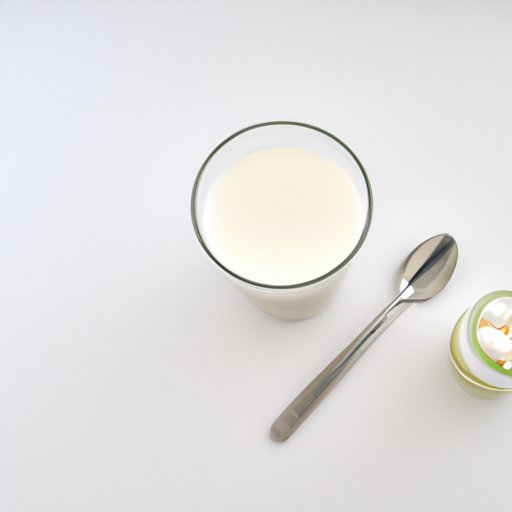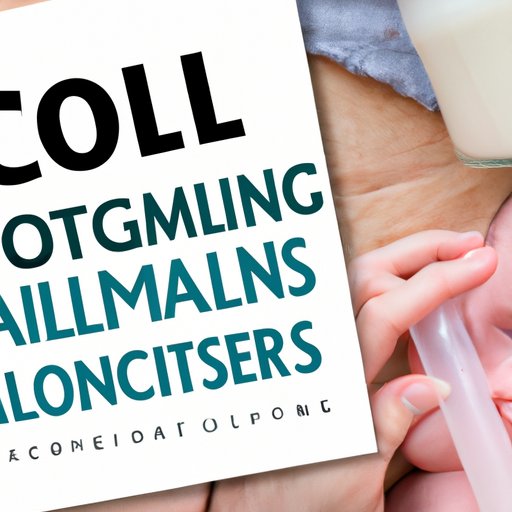
Introduction
If you’re a new mom who is breastfeeding, you know how important it is to take care of your health. One supplement that has been gaining popularity in recent years is collagen. However, many nursing mothers are unsure about whether or not it is safe to take collagen while breastfeeding. In this article, we will explore the benefits of collagen for nursing mothers and address some common concerns about consuming it while breastfeeding. We will also discuss the best ways to add collagen to your postpartum diet and provide tips for safely and effectively incorporating collagen supplements into your routine.
The Benefits of Collagen While Breastfeeding: What You Need to Know
Collagen is a protein that serves many functions in the body, and its benefits are numerous. It is essential for healthy skin, hair, nails, and bones and can also help improve gut health and joint function. For nursing mothers, the benefits of collagen are especially significant. The postpartum period can be hard on the body, and collagen can provide much-needed support and aid in recovery.
Specifically, collagen can help improve skin elasticity, which can be especially important for new mothers who are experiencing changes in their skin due to pregnancy. It can also support healthy hair and nail growth, which can be a concern for some women who experience postpartum hair loss. Furthermore, collagen can aid in the healing of tissue and joints, making it especially beneficial for women who have given birth or experienced injury during delivery.
It is important to note that there are no studies on the use of collagen supplements during breastfeeding. However, natural food sources of collagen are generally considered safe and beneficial for nursing mothers.
Understanding Collagen Supplements and Their Safety for Nursing Mothers
Collagen supplements come in various forms, including powders, capsules, and liquid. These supplements are a convenient and efficient way to increase collagen intake, but it’s important to choose a safe and high-quality product. Look for supplements that are specifically designed for breastfeeding moms and are free of harmful additives or ingredients.
When it comes to safety, collagen supplements are generally regarded as safe for most individuals, including nursing mothers. However, it’s always a good idea to speak with your healthcare provider before starting any new supplement, especially if you have any underlying health conditions or allergies.
When choosing collagen supplements, it’s important to pay attention to the dosage and recommended daily intake. Most experts recommend consuming between 2.5 and 15 grams of collagen per day, depending on your individual needs and goals. It’s also important to follow the manufacturer’s instructions on how to consume the supplement safely and effectively.
Introducing Collagen Into Your Postpartum Diet: A Guide for Breastfeeding Moms
If you prefer to get your collagen from natural food sources, there are several options to consider. Some of the best sources of collagen include bone broth, fish, eggs, and organ meats like liver. Adding these foods to your diet can be a great way to increase collagen intake while also providing other essential nutrients that are important for postpartum health.
If you’re not a fan of these foods, there are other creative ways to incorporate collagen into your diet that can be both delicious and nutritious. For example, you can add collagen powder to smoothies, coffee, or oatmeal for an extra boost of protein. You can also make homemade gummies or jellies using gelatin, which is a collagen-based product.
Remember, when it comes to incorporating collagen into your postpartum diet, variety is key. Eating a diverse range of collagen-rich foods will ensure that you’re getting all the benefits of collagen while also providing other essential nutrients that are important for postpartum recovery.

Collagen and Breastfeeding: Separating Myths from Facts
There are many myths surrounding collagen and breastfeeding, including the idea that collagen supplements can negatively impact milk production. However, there is no evidence to support this claim. In fact, collagen supplements may actually be beneficial for breast milk production and quality due to their amino acid profile.
Another common myth is that collagen supplements can cause constipation in nursing mothers. However, this is not true for everyone. Some individuals may experience digestive issues when consuming collagen, but this can often be avoided by starting with a lower dosage and gradually increasing it over time.
It’s also important to note that collagen supplements are not a replacement for a balanced and nutritious diet. While they can be a helpful addition to your postpartum routine, it’s essential to focus on eating a variety of whole foods that provide other important nutrients for both you and your developing baby.
How Collagen Can Help You Through the Postpartum Period
The postpartum period can be a challenging time, both physically and emotionally. However, collagen can offer much-needed relief from some of the common challenges that new mothers face. For example, collagen can aid in healing tissue and joints, which can be especially beneficial for women who have had a c-section or experienced tearing during delivery.
Collagen can also improve skin elasticity, which can be important for new mothers who are experiencing changes in their skin due to pregnancy and childbirth. Additionally, collagen can support healthy hair and nail growth, which can help alleviate the stress and anxiety that some women feel about postpartum hair loss.
There is also evidence to suggest that collagen supplements can help improve sleep quality, reduce anxiety and stress, and support overall immune function, all of which are important for postpartum health and well-being.
Can Collagen Supplements Affect Your Breast Milk Production?
There is no evidence to suggest that collagen supplements can negatively impact milk production. In fact, collagen supplements may actually be beneficial for nursing mothers due to their high amino acid content, which can support milk production and quality.
However, it’s always important to speak with your healthcare provider before starting any new supplement, especially if you have any concerns about your milk supply or any underlying health conditions.
If you’re concerned about the impact of collagen supplements on your milk supply, it’s important to follow the recommended daily intake guidelines and start with a lower dosage and gradually increase it over time. This can help you determine how your body responds to the supplement and prevent any negative effects on milk production.
The Science Behind Taking Collagen While Breastfeeding: What Every Mother Should Know
While there are no studies on the use of collagen supplements specifically during breastfeeding, there is ample scientific evidence to support the benefits of collagen for overall health and well-being. Collagen is an essential protein that serves many functions in the body, and its benefits are numerous.
Research has shown that collagen supplementation can improve skin health, joint function, bone density, muscle mass, and gut health. Additionally, collagen has been shown to help reduce inflammation, improve sleep quality, and support immune function, all of which are important for postpartum health and recovery.
Ultimately, the decision to take collagen supplements while breastfeeding should be made on an individual basis, taking into consideration any underlying health conditions or concerns. If you have any questions or concerns, it’s important to speak with your healthcare provider before starting any new supplement.
Conclusion
In conclusion, collagen can be a helpful supplement for breastfeeding mothers who are looking to support postpartum health and healing. Whether you choose to get collagen from natural food sources or supplements, it’s important to pay attention to dosage and safety considerations. Remember to focus on a varied and nutritious diet that supports overall health and well-being, and don’t hesitate to speak with your healthcare provider if you have any concerns or questions about consuming collagen while breastfeeding.





